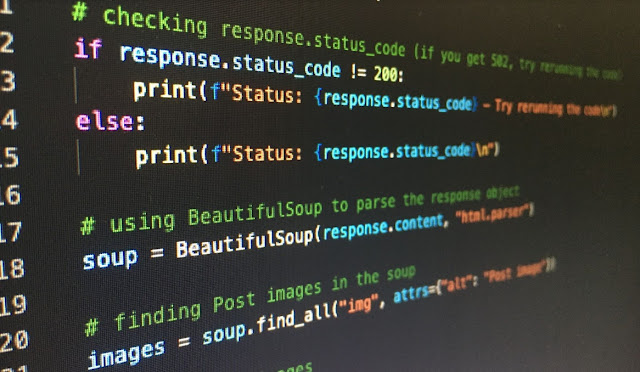It goes without saying that whether you're a professional web developer or someone who wants to create desktop GUI programs, you'll need a programming language. But even though there’s a plethora of them available, finding the right programming language may be difficult in general, particularly when dealing with big data.
This does not negate the need for careful consideration while making your selection. It is what determines whether or not your project will be successful and sustainable. Python, for instance, is the language of choice for most programmers and developers when working with large amounts of data. It is one of the world's most well-known and commonly used programming languages.
However, if you’re new to Python and need help with your homework or want to become a proficient programmer, you can get help with Python online and improve your skills. There are plenty of reasons to choose this programming language, so read below to learn a few of them.
This is a quality that not only makes it quick but also makes it very effective. Since modifying the codes is a simple process, additional development time is not required.
Whether you're a developer or a corporation seeking software assistance, it's important to think about the capabilities of the language used to create the application. A system that can scale to accommodate increasing volumes of data is essential as businesses evolve. Python, for instance, is a great option because of its adaptability and scalability. The fact that the language can be used on other major platforms just adds to the convenience of your workday.
It's easy to pick up, too, and you won't have to struggle with it for long before you get the hang of things. Also, don't forget that it offers comprehensive plans to suit your business's specific requirements.
This does not negate the need for careful consideration while making your selection. It is what determines whether or not your project will be successful and sustainable. Python, for instance, is the language of choice for most programmers and developers when working with large amounts of data. It is one of the world's most well-known and commonly used programming languages.
However, if you’re new to Python and need help with your homework or want to become a proficient programmer, you can get help with Python online and improve your skills. There are plenty of reasons to choose this programming language, so read below to learn a few of them.
Expandability and Adaptability
When working with large amounts of data, scalability is a very important consideration. Python's lightning-fast processing speeds are only one of the reasons why it's the ideal option. Even as your data volume increases, you can always depend on its continued support. It's also highly flexible, which is a huge plus. Python will assist you with backing up your MySQL database and even downloading it remotely.Learning is Simple
The last thing anybody wants to do is to utilize a programming language that leaves them scratching their heads. Remember that you are already dealing with large amounts of data, which may be intimidating. Any assistance, however little, would be much appreciated. Because of this, Python becomes necessary. Python may be used by anybody, regardless of prior programming experience or technical expertise.Which Aspects Make It Simple to Learn?
For starters, you will be given all of the resources you need to learn the language. Additional factors include the fact that the codes are completely decipherable and that you are not alone. Python's large user base means that there are plenty of people with whom you can share knowledge and receive it. This implies that for whatever issue you may have when using Python, you will be able to find an answer.Diverse Packages Available
Python has several useful packages that may be used to handle a wide variety of data tasks. NumPy is one of them, and it's useful for things like linear algebra and Fourier transformations. That simply implies that this program may be used to manage generic data and integrated with a wide variety of databases. As an alternative, there is PyBrain, which excels in machine learning and AI. Python's flexibility means it may be used for a wide variety of data analysis and manipulation tasks.Compatibility
It's in your best interest to choose Python since it's compatible with so many different tools. The majority of popular operating systems can use this language without any problems. However, Python is an interpreted language. This allows you to execute the same code on many systems without requiring a recompile, which is a big part of why it is so cross-platform friendly.This is a quality that not only makes it quick but also makes it very effective. Since modifying the codes is a simple process, additional development time is not required.
Presentation of Data
Such a language is ideal for creating data-visualization software. The top data visualization tools on the market today couldn't function without Python. Given the widespread use of this language, organizations may readily recruit employees across all divisions who are fluent in it. Management is thus able to easily create lines of contact with all parts of the company.Whether you're a developer or a corporation seeking software assistance, it's important to think about the capabilities of the language used to create the application. A system that can scale to accommodate increasing volumes of data is essential as businesses evolve. Python, for instance, is a great option because of its adaptability and scalability. The fact that the language can be used on other major platforms just adds to the convenience of your workday.
It's easy to pick up, too, and you won't have to struggle with it for long before you get the hang of things. Also, don't forget that it offers comprehensive plans to suit your business's specific requirements.

